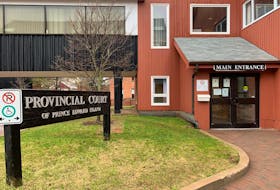The chamber is calling on government to stop the erosion of the P.E.I. school curriculum, end social promotion of students who are struggling and do more to improve education outcomes, especially in math.
“The business community is extremely concerned,” said Rory Francis, a chamber board member.
The chamber was one of several presenters Tuesday to the provincial Standing Committee on Education and Innovation, which is holding hearings on the state of education in P.E.I.
A recent survey of its business membership found employers in P.E.I. identified skills shortages as the number one barrier to competitiveness.
Quentin Bevan, president of the Greater Charlottetown Area Chamber of Commerce, explained employers in P.E.I. are seeing young workers who can’t make change without a cash register, do not have the math skills required for measuring and cutting in construction and who cannot read cursive writing.
“By not properly preparing students for what the realities of the workforce are, we feel this is seriously affecting their career opportunities and also the growth of our economy.”
P.E.I. students scored last in the country and the province was repeatedly highlighted in the 2013 PISA results for coming in below the OECD average in all three areas of testing of reading, science and math.
The chamber says this is a concerning ongoing trend for the province, pointing out P.E.I. has scored last in the country in PISA results for the last 14 years.
Education outcomes are not only important for preparing Islanders for the workforce, but also in attracting immigrants and professionals from other jurisdictions to the province, the chamber board members said.
Often the quality of P.E.I.’s education system is one of the first things potential newcomers look at when considering relocating, and the Island’s poor scores are impeding those efforts.
“We must view these PISA results as a call to action. We can do better and we must do better,” said chamber board member Steve Loggie.
“We’ve had conversations with folks in the system that said instead of pushing up in terms of our attention on math, we’re actually bringing the curriculum down to meet where the students are,” Francis added.
“This is totally a negative spiral that we’re going into… rather than improving our ability to compete and achieve we’re lowering the bar.”
They presented recommendations, including hiring only teachers with math or science backgrounds, increasing time-on-task in the classroom and ending the school system’s social promotion policy.
The chamber also suggested government should immediately establish a working group to engage parents, teachers and other stakeholders to work together in making much-needed improvements.
The education committee also heard Tuesday from the P.E.I. Literacy Alliance who also raised concern over an ever-increasing demand on its summer tutoring program at a time it is also facing a major cut its core funding by the federal government.
“Here we have one of the lowest literacy levels in Canada, with many of our citizens — approximately 25 per cent — unable to read a newspaper with understanding,” said Catherine O’Brien, executive director of the P.E.I. Literacy Alliance.
“I think we need a culture of literacy in P.E.I., a literacy policy would be a good start.”
But the low scores identified in the PISA results do not represent all of P.E.I. students, according to the superintendent of P.E.I.’s French Language School Board. Anne Bernard-Bourgeois says she requested the results from students in her board be severed from the other P.E.I. PISA results, as she is convinced they would show French students have better outcomes, especially in math.
“Because we are a small sample size PISA said they won’t take our sample size apart, but I was very impressed with those,” Bernard-Bourgeois said.
Instead of the oversized class sizes and cuts to education resources currently happening in the English Language School Board, the French school board is struggling to recruit more students into its schools.
“There’s lots of room for growth,” Bernard-Bourgeois said.
The education committee will compile a report complete with recommendations for government, which it will present during the fall session of the legislature.
The chamber is calling on government to stop the erosion of the P.E.I. school curriculum, end social promotion of students who are struggling and do more to improve education outcomes, especially in math.
“The business community is extremely concerned,” said Rory Francis, a chamber board member.
The chamber was one of several presenters Tuesday to the provincial Standing Committee on Education and Innovation, which is holding hearings on the state of education in P.E.I.
A recent survey of its business membership found employers in P.E.I. identified skills shortages as the number one barrier to competitiveness.
Quentin Bevan, president of the Greater Charlottetown Area Chamber of Commerce, explained employers in P.E.I. are seeing young workers who can’t make change without a cash register, do not have the math skills required for measuring and cutting in construction and who cannot read cursive writing.
“By not properly preparing students for what the realities of the workforce are, we feel this is seriously affecting their career opportunities and also the growth of our economy.”
P.E.I. students scored last in the country and the province was repeatedly highlighted in the 2013 PISA results for coming in below the OECD average in all three areas of testing of reading, science and math.
The chamber says this is a concerning ongoing trend for the province, pointing out P.E.I. has scored last in the country in PISA results for the last 14 years.
Education outcomes are not only important for preparing Islanders for the workforce, but also in attracting immigrants and professionals from other jurisdictions to the province, the chamber board members said.
Often the quality of P.E.I.’s education system is one of the first things potential newcomers look at when considering relocating, and the Island’s poor scores are impeding those efforts.
“We must view these PISA results as a call to action. We can do better and we must do better,” said chamber board member Steve Loggie.
“We’ve had conversations with folks in the system that said instead of pushing up in terms of our attention on math, we’re actually bringing the curriculum down to meet where the students are,” Francis added.
“This is totally a negative spiral that we’re going into… rather than improving our ability to compete and achieve we’re lowering the bar.”
They presented recommendations, including hiring only teachers with math or science backgrounds, increasing time-on-task in the classroom and ending the school system’s social promotion policy.
The chamber also suggested government should immediately establish a working group to engage parents, teachers and other stakeholders to work together in making much-needed improvements.
The education committee also heard Tuesday from the P.E.I. Literacy Alliance who also raised concern over an ever-increasing demand on its summer tutoring program at a time it is also facing a major cut its core funding by the federal government.
“Here we have one of the lowest literacy levels in Canada, with many of our citizens — approximately 25 per cent — unable to read a newspaper with understanding,” said Catherine O’Brien, executive director of the P.E.I. Literacy Alliance.
“I think we need a culture of literacy in P.E.I., a literacy policy would be a good start.”
But the low scores identified in the PISA results do not represent all of P.E.I. students, according to the superintendent of P.E.I.’s French Language School Board. Anne Bernard-Bourgeois says she requested the results from students in her board be severed from the other P.E.I. PISA results, as she is convinced they would show French students have better outcomes, especially in math.
“Because we are a small sample size PISA said they won’t take our sample size apart, but I was very impressed with those,” Bernard-Bourgeois said.
Instead of the oversized class sizes and cuts to education resources currently happening in the English Language School Board, the French school board is struggling to recruit more students into its schools.
“There’s lots of room for growth,” Bernard-Bourgeois said.
The education committee will compile a report complete with recommendations for government, which it will present during the fall session of the legislature.









